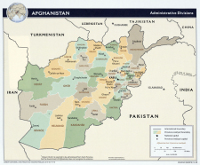Afghan and Coalition forces have leveled another blow at the Taliban’s top leadership in the northern province of Baghlan.
A joint Afghan and Coalition force captured the Taliban’s newly appointed shadow governor of Baghlan during a May 31 raid in the Baghlan-i-Jadid district “after intelligence information revealed insurgent activity,” the International Security Assistance Force stated in a press release today on its website.
The shadow governor of Baghlan, whose name was not provided by ISAF, was captured “as he prepared to leave for Pakistan.” One of his associates was killed and an undisclosed number were captured during the raid.
The joint Afghan-Coalition special operations forces have put pressure on the Taliban to quickly promote new leaders, ISAF said. “This capture marks the third time in as many weeks that the Taliban have had to replace named shadow governors for Baghlan province because of Coalition operations,” the press release stated.
The unnamed captured shadow governor spent only two days as the top Taliban leader for Baghlan. His predecessor, Mullah Rohullah, was killed in a Coalition airstrike on May 29. Rohullah was appointed the shadow governor of Baghlan in early May.
Background on the Taliban’s shadow government and the situation in the north
The Taliban establish shadow or parallel governments in the regions they control or where the Afghan government is weak. These shadow governments fill the void by dispensing sharia justice; mediating tribal and land disputes; collecting taxes; and recruiting, arming, and training fighters.
The Taliban have established shadow governments throughout Afghanistan, with provincial and militarily leaders appointed to command activities. In January 2009, the Taliban claimed to be in control of more than 70 percent of Afghanistan’s rural areas and to have established shadow governments in 31 of Afghanistan’s 34 provinces.
Over the past two years, the security situation in the northern provinces of Baghlan and neighboring Kunduz has deteriorated. The Taliban and allied terror groups maintain safe havens in Baghlan and Kunduz, and control large portions of the provinces. Two districts in Baghlan province – Baghlan-i-Jadid and Burka – are under the control of the Taliban. Of the seven districts in Kunduz province, only two are considered under government control; the rest of the districts – Chahara Dara, Dashti Archi, Ali Abab, Khan Abad, and Iman Sahib – are considered contested or under Taliban control, according to a map produced by Afghanistan’s Interior Ministry in the spring of 2009 [see LWJ report, “Afghan forces and Taliban clash in Kunduz,” and Threat Matrix report, “Afghanistan’s wild-wild North”].
The Taliban’s top leadership in the north has been hit hard over the past year, however. Afghan intelligence captured the shadow governor of Samangan province on May 20. Afghan officials claimed the shadow governor of Kunduz province was killed on April 26. Pakistani intelligence reportedly detained the shadow governors of Kunduz and Baghlan in February. And in September 2009, police detained the shadow governor of Bamyan province.









6 Comments
Despite the propaganda fueled t-ban attacks, we have gotten some good hits against the jihadist leaders.
Time to keep up the momentum and also sow them that their safe haven in pak are not safe from ground incursions either.
The US shouldn’t allow the Afghans to operate their own prisons, because they are notorious for giving them a slap on the wrist and letting them go, or just taking a bribe and letting them go. It may be just their “culture”, but they/we can’t possibly win this war with behavior like that.
@Max. I read a piece recently that the Canadians have been handing over their detainees in Kandahar to the Afghans and that the view by the “peaceniks” and human rights community up there is that the Afghans are far too rough with their captives.
So, maybe there is a culture shift underway?
My information came from a Time/Newsweek/NYT (can’t remember which) article online about this subject.
I realize they are liberals with an agenda, but I don’t know how they would have anything to gain by making the Afghan police look bad. I think the story was pretty factual.
@Max. No, you are correct: The Afghan police were a major source of the problem in Afghanistan the last five years. They were thoroughly corrupt and gave Afghans no reason to believe in any better future than surviving that day of Taliban local rule.
That’s changing. It is. In Helmand Province General Nicholson set up a boot camp to train policemen, and most of the cadets heading for service there were from outside the Province.
I have a lot of confidence that Petraeus/McChrystal/Rodriguez/Scaparrotti/Carter/Nicholson et al know/knew the score. Units like the 101st, 1st MED and 10th Mountain and are coming in trained for this unusual battlespace.
Will the civilian (State Dept/UN/AID etc.) side step up like they did in Iraq? That’s the achilles heel in my view. I haven’t seen the push from this Administration I did from the last in Iraq in that regard. And, our putative NATO allies are squishy to say the least and politics are playing too much a role as evidenced by the Brit blowback to setting up a Regional Command South West headed by Marine two star Mills.
If we can forge some progress, the NATO allies will pour resources and personnel into the fray. They want to be part of a winning program and the politicos have significant vested interest in this campaign ending successfully.
The Euros don’t need to be involved in kinetic campaigns in Kandahar and Kundoz, they just need to bring their great expertise in national policing and logistics to the stew. I think Obama’s timeline works against that investment. We’ll see.
According to Pollyvote Obama will probably be reelected. He will most likely draw down, but not completely, that is very likely a lie.
Obviously he lacks willpower.
I’m sure NATO will send more if things go well, but probably ‘pouring’, especially lives.